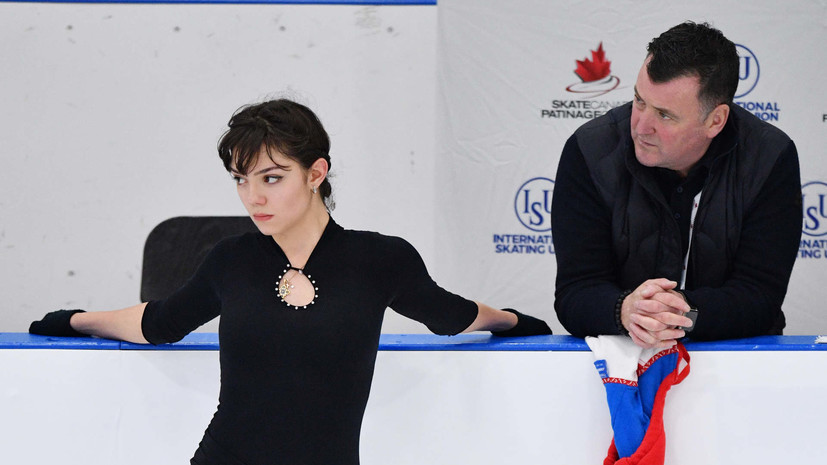- Are you satisfied with how Eugene performed at the Grand Prix in Moscow?
- Yes, of course, I am very pleased with the short, free programs. She has a very correct attitude. And it was important for her to speak well here and get decent grades, since Eugene worked hard - according to her, she had never worked so much and fruitfully. In such cases, I would like to see the fruits of our labor, so we see them. It's simple: hard work - and acquired faith in their skills.
- Eugene said that she was learning to perform the quadruple jump. Can you tell how much she has advanced in this?
- There is progress. She is in good physical shape, so we’ll just continue to work on it. This contest is behind, and Evgeny probably will not get into the Grand Prix finals, so we will have time to return to the quadruple jumps and focus on them. Salkhov is her best jump. She constantly watches videos, plus wonderful skaters who perform quadruple salchow train together at the rink.
- Is it possible to remain competitive without quadruples now?
- Yes, without a doubt, and, perhaps, Eugene demonstrates this. In the female hierarchy, she is on a par with such magnificent skaters as Kim Yo Na, Carolina Costner, Mao Asada, Miki Ando, Katarina Witt. The list goes on and on. And, of course, we need to withstand competition, which we continue to do.
- Many experts suggest changing age limits in women's skating. How do you comment on this?
- I do not know. I don’t get into these issues, because I can’t influence it in any way. My coaching career, albeit not very long, confirms one truth: no matter how the rules are transformed, you just need to adapt to them. For example, serious changes occurred in the judging system, and many of my colleagues in figure skating were unhappy, but I just accepted these changes for myself. After all, we are required to prepare highly professional skaters who have good jumps, spins, choreography, the ability to skate skillfully and look beautiful on ice. This is what you need to do. We look at what is required of us, and do it, try to learn and learn.
“Have you heard how Medvedev reacted to your words that she is in her best shape?”
- No, not even in the know.
“She said it was just the best form you saw.” Do you think she is able to add more?
- Yes, it is always possible. The point is not to do something more, more and more. It is important how your work is built. If, say, you work on quadruple salchow, the benefits of training will be not so much from trying to perform them at the rink, but from working outside the rink. You need to build up strength, learn to perform the movement vigorously. A certain psychological preparation is also required in order to trust yourself and not be afraid. All these are the components necessary for improvement.
“But more is not always better ...”
- Exactly! It is important to train effectively. Eugenia and I are adults and found a specific format of work. We have disagreements: either it stubbornly, then I, sometimes we find a compromise. Sometimes I agree with her plan, and sometimes she with mine, and we do things the way it will be better for her. One way or another, this is my coaching style. It is necessary to allow the athlete to control the situation. Of course, I can help and guide, so that my wards can continue to work and make progress.
- Yesterday, she also said that jumping at 20 was not the same as jumping at 15.
- Yes, we remember this every now and then, but you cannot return to the past. (Laughs)
It is foolish to compare the technique of a teenager with the technique of a person in the post-puberty period. The body is changing, sensations are changing, thinking is changing. Any athlete passes through this, not only in figure skating, and for everyone it is not easy, but we try our best!
- Is it interesting to overcome such difficulties with adult skaters?
- Yes. I work with juniors, I had very successful pupils, and now I have them in Canada, however, we do not see them very often. But I like working with adults. It is necessary to relate to each other, as adults, and with respect.
- Famous Soviet figure skater, Olympic champion Natalya Bestemyanova ...
- ABOUT! This is my era!
- ... says that Eugene could have experienced psychological difficulties, realizing that competitors have more difficult programs.
- It seems to me that this is not a psychological problem, but a sober assessment: “How can I get extra points? What can these people get around to? ”I remember how I started working with Yuzuru Hanyu, his main opponent was Patrick Chan, whom he was lagging behind, and not because he needed more technical techniques - Patrick took amazing skating skills and energy, he literally swam over the ice, leaving graceful lines on it.
“And what did you do?”
- We analyzed his style and decided to focus on this component. At each competition, Yuzuru was getting closer and closer to Patrick, finally he got flush and then got ahead. The emphasis was on this, but, of course, we continued to set jumps and magnificent quadruples. And he added new jumps, a quadruple sheepskin coat ... And the quadruple lutz, it seems, demonstrated in Moscow. So the point is not only to perform a more impressive and complex technique. There are many ways that will allow you to score points. It’s just that sometimes it takes a little longer ...

